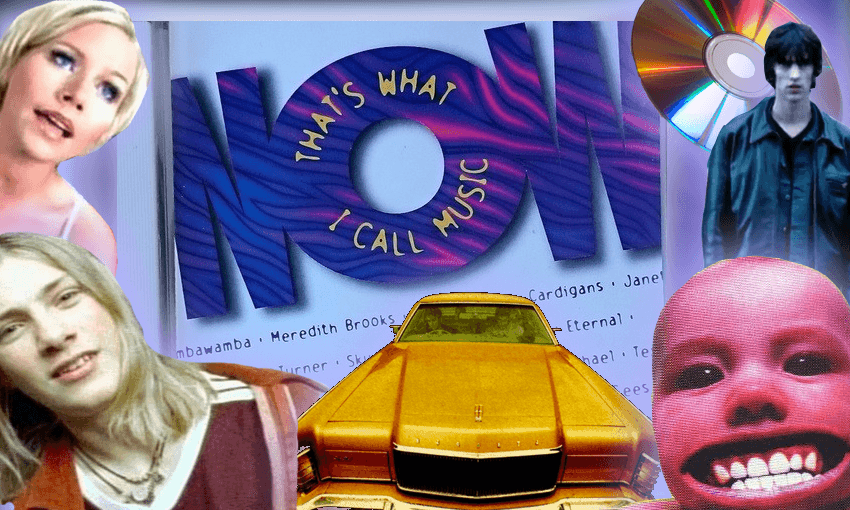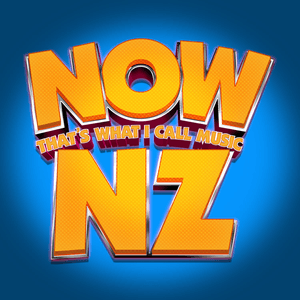1997 was a simpler time – British anarchists topped the charts and you could buy collections of the day’s hits on little plastic discs. It was also the year the very first local edition of Now That’s What I Call Music was released. Henry Oliver takes a listen to Now! Vol 1.
It’s the end of September 1997. Some guy named Jim Bolger is prime minister (soon to be rolled by Jenny Shipley). Bill Clinton is the still-scandal-free US president. A previously unknown British author has just released an “adult edition” of her smash hit book about a boy at a fancy school for wizards because parents have become embarrassed about reading a kids book on the way to work. All your friends are re-telling jokes from a new cartoon about a group of foul-mouthed kids in Colorado. An infant Lydia Ko has just moved to New Zealand. The world is mourning Princess Diana’s death. And a band of British anarchists is at the top of the New Zealand singles chart.
The song begins with a looping electro-beat and an ascendant synth line which builds to a sample from one of the many feel-good movies about Middle England that came out once a year: “The truth is, I thought it mattered. I thought that music mattered. But does it bollocks, not compared to how people matter.”
The beat stops and some distorted voices, awash in effects, cut in backed by an acoustic guitar: We’ll be singing when we’re winning, we’ll be singing…
Stop.
I GET KNOCKED DOWN, BUT I GET UP AGAIN!
YOU ARE NEVER GONNA KEEP ME DOWN!
I GET KNOCKED DOWN, BUT I GET UP AGAIN!
YOU ARE NEVER GONNA KEEP ME DOWN!
So begins Chumbawamba’s ‘Tubthumping’, the defining song of the year (according to our super scientific Twitter poll) and the first song on the first New Zealand edition of Now That’s What I Call Music (after a short run in the early-90s), the long-running popular music compilation now in its 21st year.
After years of ubiquity on classic hits radio, sports stadiums, and TV ads, it’s easy to forget just how weird a song ‘Tubthumping’ is. While the anthemic (not a word used lightly) chorus is etched in the brains of everyone who lived through the ‘90s, there’s the whiskey/vodka/lager/cider drink bit and the “pissing the night away” bit and the Irish-bar-band “oh, Danny Boy” bit, all squished together by a band of anarchist punks who came up playing squats and releasing their own records.
Basically, it’s the complete opposite of another monster hit from that year, and the second most-voted song on our poll, ‘MMMBop’ by the then 11-, 13-, and 16-year-old Oklahoman brothers Hanson. ‘MMBop’ sounds like a white version of Jackson 5 mixed with the Beach Boys and, perhaps due to the production of the Dust Brothers, a tween-friendly Beck. In fact, except for the record scratches (which are due for a comeback BTW), ‘MMMBop’ sounds strangely fresh, even though upbeat happy music is officially out of fashion and out of the charts. Also surprising is that ‘MMMBop’ was not only a commercial hit (it topped the charts in 14 countries, including New Zealand) but also a critical triumph, topping the most prestigious end-of-year poll (until the mid-00s at least) the Village Voice’s Pazz & Jop poll. Number two, by the way, was ‘Tubthumping’.
Not a huge vote-getter in our poll, but the subject of the most love in the comments, is The Cardigans’ ‘Lovefool’, initially a sleeper hit that slowly spread from its native Sweden to the UK and, after its inclusion in Romeo + Juliet (which didn’t play here until 1997), to New Zealand and finally the US after a re-release. ‘Lovefool’ is kind of a perfect song: upbeat, lovelorn, catchy as hell and tightly arranged to the micro-second. There’s no moment in the song that can be done without. The drums snap, the rhythm guitar cuts, the lead guitar fuzzes perfectly, and the vocals have that English-as-a-second-language perfection. (Oh, and it’s an almost un-fuckup-able karaoke hit too.)
Other hits that have stood the test of time are Britpop classic ‘Bitter Sweet Symphony’ by The Verve (which, maybe because it’s sample-based, has held up better than, say, Oasis) and Blur’s fake-grunge song ‘Song 2’ which has become a pro sports audience chant as much as an actual song that you’d listen to (still, a great guitar riff and you can’t mess with that chorus – WOOHOO!!). But the best one-hit-wonder of the collection (one of the joys of That’s What I Call Music is that it contains the complete modern history of one-hit-wonders, but more on that in a future episode) is undoubtedly White Town’s ‘Your Woman’.
Built on a sample of Lew Stone Monseigneur Band’s ‘My Woman’ from 1932, the song sounds like a precursor to Gorillaz and other 2000s bands that combined hip-hop inspired sampling/drum machines with indie-ish vocals/arrangements. In this amazing Q&A on his website, White Town’s Jyoti Prakash Mishra says he recorded the song in his bedroom with a couple of grands’ worth of equipment, including an eight-track cassette recorder.
He tells his fans that the song (which reached #5 on the New Zealand charts) is about “being a member of an orthodox Trotskyist / Marxist movement (as I was for three years in the 80s). Being a straight guy in love with a lesbian (ditto). Being a gay guy in love with a straight man (not tried this one yet). Being a straight girl in love with a lying, two-timing, fake-ass Marxist. The hypocrisy that results when love and lust get mixed up with highbrow ideas.” (As an aside: How many other years contained two infectious global hits by anarchists and orthodox Trotskyists?!)
“How do you feel about being a one-hit wonder?” a fan asks.
“Better than being a no-hit wonder!”
This content is brought to you by Now That’s What I Call Music New Zealand and Universal Music. Listen to and talk about all the Now That’s What I Call Music New Zealand compilations on Spotify and Facebook.

